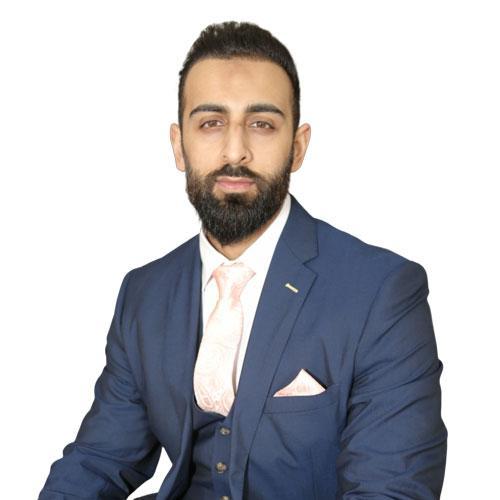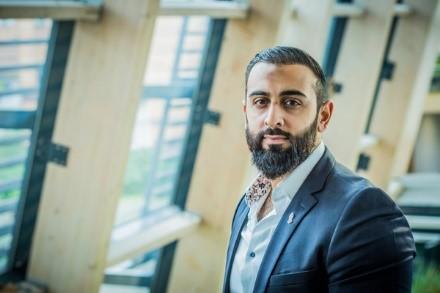Dr Kamran Mahroof, Assistant Professor, Supply Chain Analytics
- BSc Marketing
- MRES in Management/Law, 2017
- Phd, Operations and Information Management, 2019
- Programme Leader of MSc Applied Artificial Intelligence and Data Analytics
What a year...
It’s been quite the year for Dr Kamran Mahroof, who in addition to his research impact and dissemination has also been hitting high with his contributions on the learning and teaching front. He was firstly nominated by colleagues and students at this year’s ‘Outstanding Achievers Awards’ at the University of Bradford. The assessment panel reviewed 74 nominations and Kamran won the Outstanding Contribution - individual award, which was sponsored by our Vice-Chancellor, Professor Shirley Congdon, for leading the Faculty of Management, Law and Social Sciences blended learning approach during the pandemic situation. He led the project to develop an inclusive Canvas (e-learning) template as part of our blended learning offer, which has made content more inclusive, accessible and easier to navigate for students.
If this wasn’t enough, Kamran was also voted as ‘Best Lecturer of the Year’ at the University of Bradford UBU Kickstart 2021 Awards, which is a student-led award. Since joining the School, Kamran has placed emphasis on making a positive difference to the student experience, which he describes as being ‘very rewarding’, which is pretty evident, given the year he is having.

Current Affairs with Dr Kamran Mahroof
Dr Mahroof has had a busy few months at the start of the academic year in 2021 with plenty of media coverage, having participated in 3 BBC television interviews (including the BBC Breakfast Show) 2 BBC and 1 BCB radio interviews, as well as contributing towards an opinion piece with and the T&A news. Kamran, a former Morrisons supply chain specialist, shared his thoughts on the ongoing supply chain disruptions, discussing a range of issues linked to his area of expertise, from the ongoing current HGV driver shortages, the semi-conductor shortages, and its wider impact for consumers and the impact panic buying has on supply networks.
He emphasised that there was a pressing need to appreciate the recovery times, following panic buying behaviour and advised that competitors, are often served by the same suppliers, yet compete for the same market, therefore highlighting the opportunities for better collaboration and cooperation to overcome supply chain inefficiencies. In addition to collaboration and cooperation between competitors, he highlighted ‘parcels as passengers’ and the opportunities to tap into rail freight transportation, as a short to long-term alternative to solely relying on the haulage industry.
Kamran also advised the government to take more proactive steps to overcome and mitigate such disruptions, through the better utilisation of data, as we enter the busiest time of the year in terms of supply chain demand and volumes. As the Programme Leader for the MSc Applied Artificial Intelligence and Data Analytics programme, he highlighted, the need for a better response to such supply chain disruptions and ‘black-swan’ events (high impact; low probability of scenarios) through predictive and prescriptive analytics (predicting and better forecasting) which is possible given the volumes of data we have and continue to collect on a daily basis.

Food waste – The Conversation and World Economic Forum
Public dissemination, impact and outreach is highly important and engaging in opinion pieces and non-academic writing helps you to reflect on your writing and also focus on the practical implications of the research we do, as academics.
With that said, Dr Kamran Mahroof and Prof. Sankar Sivarajah have done exactly that, by receiving notable national and international attention following their widely read opinion piece on food waste, for The Conversation UK titled; “We throw away a third of the food we grow – here’s what to do about waste”. The article was very well received and the crowning moment for the article was having it re-shared and published by the World Economic Forum - https://www.weforum.org/agenda/2021/08/one-third-of-food-produced-globally-does-not-get-consumed-how-can-we-reduce-food-waste/
The article proposed several practical steps to overcome food waste, from the role a) AI drones and Precision farming in minimising food waste in production, b) ‘targeting the wallet’ and emphasising the potential money that can be saved with more responsible shopping practices, c) the opportunities of overcoming food waste through more circular approaches and upcycling and d) the need for better planning of meals around sell-by dates, all of which can collectively help towards overcoming food waste.
We hope the research our colleagues are engaged with can help you reflect and evaluate how you manage your shopping lists going forward!
